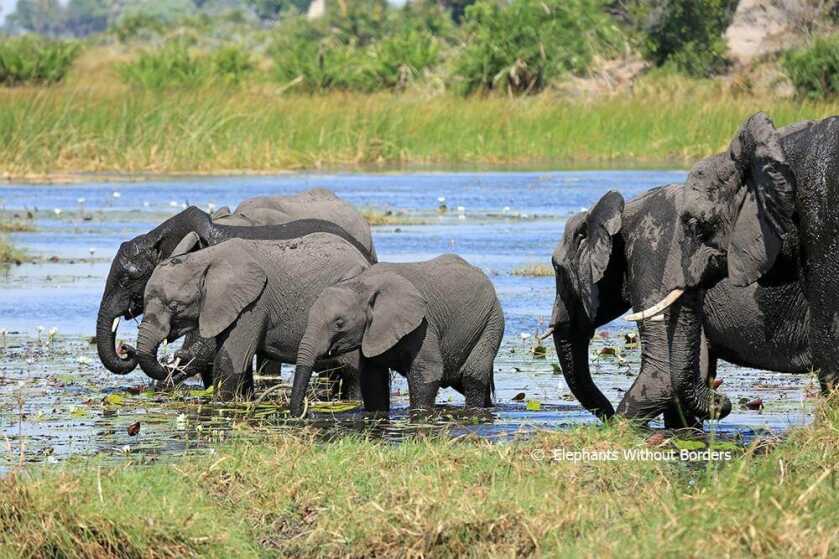
Botswana has lifted their ban on elephant hunting, facing international backlash. The country’s former President Ian Khama, who instated the ban five years ago, says that ending the ban won’t solve any of the country’s problems.
Because in Botswana, elephants can be a real problem, according to residents. Elephants raid farms and ruin crops, and young bulls attack and maul people, particularly in rural areas, where the animals are not popular.
“In the old days we used to hunt them and shoot them. To get rid of them, we need to shoot all of the elephants,” said village leader Kenneth Moboya, in an interview with CNN. Moboya himself was attacked by an elephant that he shot several times while protecting a local farm.
Khama and others don’t believe that culling the elephant population will have any effect. “Resorting to killing is a blood policy that should not be supported,” said Khama. “This will not have an impact on human animal incidents. It is a political move.”
Botswana has a large stockpile of government-owned ivory. Lifting the ban on ivory sales could mean lots of money for administrators in addition to hunters.
The monetary damage caused by elephants is also relatively small. Records indicate that over the past nine years 36 people have been killed by elephants, costing about $2 million in compensatory damages.
“Compare how many people are killed by elephants to how many are killed in drunk driving incidents,” said Khama.
This is despite having the largest elephant population on the continent, with about 130,000 animals in what some conservationists consider the last “elephant sanctuary.”
Calling it a true elephant sanctuary could be a stretch: poachers have targeted Botswana’s elephant population for its sheer size, and according to the Elephants Without Borders project, poaching is up, in some cases five-fold.
“We call this the elephant heartland,” said Elephants Without Borders founder Mike Chase. “It is the last sanctuary for elephants in Africa. What we thought was a sanctuary is no longer, of course, because poachers have discovered this is an area where big bulls congregate.”
If the government begins the sale of its ivory stock, poachers could further use the new market as a cover for their black market goods. Still, others argue that a controlled ivory market with legal elephant hunting is ultimately safer than a complete ban which, many argue, guarantees a black market.
See Also: Poachers Reportedly Kill 87 Elephants Near Botswana Sanctuary
Despite the controversy, Botswanan leaders are pushing forward with the new policy to allow elephant hunting. Revenues from hunting and a legitimate ivory trade could ultimately be what pays to support such a large elephant population.
“The whole world right now is trying to close those ivory markets and the question is, are we sitting on a ticking time-bomb,” asked Botswana’s environment and tourism minister Kitso Mokaila. “Because when people eventually say we are sick and tired of being zookeepers, when there is no return in investment and they go randomly out there and massacre them, that is the real problem.”
“They are not where we are and therefore don’t live our experience,” continued Mokaila. “And it always OK to be a critic from the comfort of your home or the comfort of your environment … not understanding what our issues are.”


History shows conclusively that ‘Banning’ nearly ANY ‘popular’ or desired item, activity or thing results in a black market.
Black markets don’t pay or make taxes for the people, and they often cost lives in enforcement and in ‘collateral damage’.
This is really about anti hunters and animal rights activists, plain and simple. They would allow the very destruction of that which they claim to want to protect, just to assuage their guilt over an animals death.
What about putting out a new law , DEATH Penalty for poachers and traffickers of elephant’s ivory. That would be the solution, or putting a prize on the head of elephant’s hunters and poachers, that sounds better to me.
Many poachers already face death, whether by the elephants’ actions or through being engaged by wardens. They know going in, that’s the risk they run by engaging in the black market ivory trade forced underground by the ban. If the government opened its stockpiles, it would not encourage more poaching under the guise of legitimate ivory trade; it would lower the price of ivory and thus de-incentivize the black market–supply and demand. You and the author of this should watch the President’s (of Botswana) 15-minute speech in Vegas on this topic. He clearly explained there would be areas managed like a zoo and preserved from hunting, but, not everywhere can be; those areas would be opened to regulated hunting. To suggest that hunters be killed, when they bring in 10 times the revenue of the photo takers, is just insanity! Obviously, you’re a liberal. Look at the model that South Africa has been using, with great success, since the 1970s. Hunting IS conservation. And if you just sit back and watch and hope, eventually, poachers will get them all. From where do you think the dollars for anti-poaching units come???
I agree every time one makes something illegal it drives it underground.
Proper regulated hunting will pay for crop compensation,more game wardens and undermines the poachers